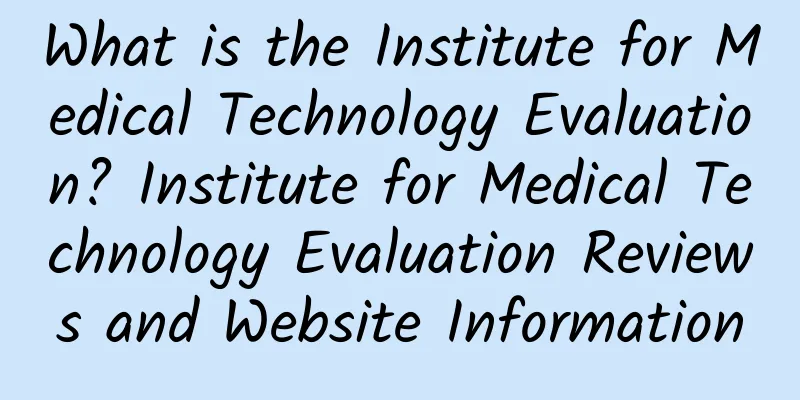What is the Institute for Medical Technology Evaluation? Institute for Medical Technology Evaluation Reviews and Website Information

|
What is the website of the Institute for Medical Technology Assessment? The Institute for Medical Technology Assessment (iMTA) is a world-renowned institute for medical technology assessment research. It was founded by Professor Frans Rutten at Erasmus University Rotterdam in 1988 and is known for its independent operation and outstanding medical research results (including health economics and health outcomes research). Website: www.imta.nl Institute for Medical Technology Evaluation: A global leader in health economics and outcomes researchThe Institute for Medical Technology Assessment (iMTA) is a globally recognized independent research organization focusing on health economics and outcomes research. Since its founding in 1988 by Professor Frans Rutten at Erasmus University Rotterdam in the Netherlands, iMTA has become a benchmark in the field of medical technology assessment, providing scientific basis for policymakers, medical institutions and enterprises, and promoting the optimization and innovation of the medical system. As a research institute known for its independent operation, iMTA is committed to solving complex medical decision-making problems through rigorous scientific research methods. Its research covers a variety of fields such as drugs, medical devices, diagnostic tools, and medical services, aiming to evaluate the clinical effects, economic value, and social impact of these technologies. With its outstanding research results and extensive international cooperation, iMTA not only enjoys a high reputation in the academic community, but also plays an important role in global medical policy making. This article will explore the historical background, core mission, research areas and far-reaching impact of the Institute for Medical Technology Assessment on the global medical industry. It will also introduce the functions and resources of its official website www.imta.nl to help readers fully understand this leading organization. The origin and development of iMTAThe history of the Institute for Medical Technology Assessment (iMTA) can be traced back to 1988, when it was founded by the famous scholar Professor Frans Rutten at Erasmus University Rotterdam in the Netherlands. Professor Frans Rutten is an expert with pioneering contributions in the field of health economics. He is keenly aware that with the rapid development of medical technology, how to scientifically evaluate the effectiveness and economic efficiency of these technologies has become an urgent problem to be solved. Based on this insight, Professor Rutten founded iMTA to fill the gap in the field of medical technology assessment. Over the past three decades, iMTA has experienced significant development and transformation. From an initial single research group, it has gradually expanded to a comprehensive institution with multiple research departments and interdisciplinary teams. iMTA's success is due to its consistent adherence to an independent operating model, which ensures the objectivity and scientific nature of its research work. Whether in government-funded projects or commercial cooperation, iMTA has always maintained a transparent and fair attitude and won widespread trust. In addition, iMTA is actively involved in international network building and has established partnerships with top research institutions around the world. For example, it works closely with organizations such as the World Health Organization (WHO) and the European Medicines Agency (EMA) to jointly promote the development of global medical technology assessment standards. This global vision enables iMTA to respond to increasingly complex and diverse medical challenges, while also providing a wider range of applicability for its research results. It is worth noting that the development of iMTA is also inseparable from the support of its host institution, Erasmus University Rotterdam. As a university with a long history and emphasis on innovation, Erasmus University provides iMTA with rich academic resources and research environment, promoting its continuous breakthroughs in the field of health economics and outcomes research. iMTA's Core Mission and ValuesThe core mission of the Institute for Medical Technology Assessment (iMTA) is to improve the overall performance of the global healthcare system by promoting the rational use and efficient allocation of medical technologies through scientific research. This mission is based on three key goals: improving the economic value of medical technologies, optimizing the allocation of medical resources, and enhancing the quality of life of patients. To achieve these goals, iMTA adheres to a series of core values, including independence, scientific rigor, and social responsibility. First, independence is one of iMTA's most prominent features. As a non-profit research organization, iMTA is not influenced by any particular interest group and is able to conduct research in an objective and impartial manner. This independence is reflected not only in its research methods, but also in its cooperation with different stakeholders. Whether it is providing policy recommendations for government departments or developing evaluation models for enterprises, iMTA always adheres to data and evidence as the basis to ensure the reliability and credibility of research results. Secondly, scientific rigor runs through all iMTA's research activities. The agency uses the most advanced statistical analysis tools and modeling techniques, combined with multidisciplinary expertise, to conduct comprehensive and in-depth evaluations of medical technologies. For example, in pharmacoeconomic studies, iMTA will comprehensively consider the cost-effectiveness ratio, long-term efficacy, and potential social impact of drugs to ensure that the evaluation results can provide sufficient reference for decision makers. In addition, iMTA is also actively developing new research methods and technologies to meet changing medical needs and challenges. Finally, social responsibility drives all iMTA's actions. As an organization dedicated to public health, iMTA always pays attention to how to improve patients' health and quality of life through technological innovation. To this end, iMTA not only pays attention to the economic value of medical technology, but also attaches importance to its ethical significance and social impact. For example, when evaluating certain high-cost but potentially life-saving treatment options, iMTA will weigh its economic benefits and humanitarian value, and strive to find a balance to maximize the overall benefits for society. In summary, iMTA's core mission and values reflect its persistent pursuit of scientific research and its deep understanding of social responsibility. It is this unique combination that enables iMTA to take a leading position in the field of global medical technology assessment and continue to make important contributions to human health. Main research areas and methodologies of iMTAThe Institute for Medical Technology Assessment (iMTA) is known for its extensive scientific research coverage and deep expertise, focusing on two major areas: health economics and outcomes research. These studies not only cover the technical evaluation of drugs, medical devices and diagnostic tools, but also include the quality and efficiency analysis of medical services. iMTA uses a series of advanced research methods to ensure that its evaluation results are highly scientific and practical. In health economic research, iMTA focuses on Cost-Effectiveness Analysis (CEA) and Cost-Utility Analysis (CUA). These methods help decision makers determine whether a technology is worth investing in by quantifying the costs and benefits of medical interventions. For example, iMTA may evaluate the cost-effectiveness of a new anti-cancer drug, considering its therapeutic effects, side effects, and impact on patients' quality of life. In addition, iMTA has developed Dynamic Disease Simulation Models to predict the effects and economic impacts of long-term medical interventions. This approach is particularly suitable for chronic disease management, such as long-term monitoring and treatment of diabetes or cardiovascular disease. In the area of health outcomes research, iMTA focuses on patient-reported outcome measures (PROMs) and quality of life assessment (QoL). PROMs is a direct measure of a patient's subjective experience, including pain levels, emotional states, and ability to carry out daily activities. By collecting and analyzing this data, iMTA is able to gain a more comprehensive understanding of the impact of medical technology on patients' actual lives. For example, when evaluating a new type of knee replacement surgery, iMTA might investigate how quickly patients recover after surgery, the degree of pain relief, and the likelihood of returning to work. In addition to traditional quantitative analysis methods, iMTA also widely uses qualitative research methods such as interviews, focus group discussions, and case studies. These methods help reveal the sociocultural factors and patient preferences behind medical technology, providing a more comprehensive perspective for policy making. For example, iMTA once conducted interviews to understand patients' acceptance of telemedicine services and found that although the technology itself is feasible, some patients still prefer face-to-face diagnosis and treatment experiences. It is worth mentioning that iMTA is also good at integrating multiple research methods into a comprehensive framework to deal with complex medical decision-making problems. For example, when evaluating the introduction of a new vaccine, iMTA may combine epidemiological data, economic models, and public opinions to ensure that the evaluation results are both scientific and close to real needs. This interdisciplinary research method not only improves the accuracy of the evaluation, but also provides stronger practical guidance for the implementation of medical technology and policies. Overall, iMTA's research methodology reflects its pursuit of scientific rigor and its deep understanding of diverse medical needs. Through the application of these methods, iMTA has set a benchmark in the field of medical technology assessment worldwide and provided valuable decision-making support for policymakers and industry practitioners. iMTA's International Cooperation and Global InfluenceAs a global leader in medical technology assessment, the Institute for Medical Technology Assessment (iMTA) has significantly enhanced its global influence through extensive international cooperation and participation in international organizations. iMTA has established close cooperative relations with the World Health Organization (WHO), the European Medicines Agency (EMA) and other international organizations to jointly promote the formulation and implementation of global medical technology assessment standards. The cooperation with the World Health Organization is particularly noteworthy. iMTA assisted the WHO in developing a set of standardized medical technology assessment guidelines, which have been adopted by many countries and regions to evaluate the safety, effectiveness and economy of new drugs and medical devices. For example, the "Global Health Technology Assessment Framework" designed by iMTA has been incorporated into the WHO's policy recommendations to help low-income countries improve the efficiency and fairness of their medical systems. At the European level, iMTA's cooperation with the European Medicines Agency (EMA) has also achieved fruitful results. As an important partner of EMA, iMTA has provided it with a number of research supports on pharmacoeconomics and health outcomes. For example, when evaluating the market access of a new anti-cancer drug, the economic model and data analysis provided by iMTA provided a scientific basis for EMA's decision-making. In addition, iMTA also participated in the "Joint Health Technology Assessment Programme" initiated by EMA, and worked with research institutions in other European countries to optimize the cross-border medical technology assessment process. In addition to cooperation with international organizations, iMTA also actively participates in global academic exchanges, regularly holds international conferences and seminars, and attracts experts and scholars from all over the world to share their research results. For example, the "iMTA International Health Economics Conference" invites the world's top economists, medical experts and policy makers every year to discuss the latest trends and challenges in medical technology assessment. These activities not only promote the dissemination of knowledge, but also win more international recognition for iMTA. In addition, iMTA has trained a group of professional medical technology assessment talents for the world through training programs and educational courses. Its "Master's Program in Health Economics and Outcome Research" has attracted students from Asia, Africa and South America, injecting new vitality into the medical systems in these regions. For example, a graduate from South Africa successfully applied the knowledge he learned from iMTA to his country's AIDS prevention and treatment program, significantly improving the cost-effectiveness of the project. In short, iMTA continues to expand its global influence through cooperation with international organizations, academic exchanges, and talent training. These efforts not only consolidate iMTA's leadership in the field of medical technology assessment, but also make important contributions to the improvement of the global medical system. Functions and resources of the iMTA official websiteThe official website of the Institute for Medical Technology Assessment (iMTA), www.imta.nl , is a comprehensive platform for information sharing, resource acquisition and interactive communication. The website not only showcases iMTA's research results and latest developments, but also provides visitors with a wealth of academic resources and practical tools, making it an important portal in the field of global medical technology assessment. First, the homepage of the website is simple and clear. Users can quickly browse the main columns through the navigation bar, including "About Us", "Research Fields", "Publications", "News and Activities" and "Contact Us". Among them, the "About Us" section introduces the history, mission and team members of iMTA in detail, helping visitors to gain a deeper understanding of the background and professional strength of this institution. The "Research Fields" section lists iMTA's current key research projects and cooperation cases according to health economics, health outcomes and other cross-disciplinary classifications. The "Publications" section is an indispensable resource library for users who want to learn more about iMTA's research results. It contains academic papers, research reports, policy briefs and technical guidelines published by iMTA, all of which can be downloaded for free. In addition, the website also has a dedicated "Tools and Models" page, which provides a series of open-use evaluation tools and software, such as cost-effectiveness analysis calculators and dynamic disease simulation models. These tools are not only suitable for researchers, but also for policymakers and corporate professionals. In order to enhance the user experience, www.imta.nl has also launched a "News and Events" section to timely update the information of international conferences, seminars and training courses that iMTA participates in. Users can receive the latest research progress and event notifications by subscribing to the website's mailing list. In addition, the website also has an interactive forum for visitors to discuss hot topics related to medical technology assessment, further promoting exchanges and cooperation in the academic community. It is worth mentioning that www.imta.nl provides multi-language support, including English, Dutch and some translated content into Chinese, which is convenient for global users to access. This international design reflects iMTA's vision of promoting the development of global medical technology assessment. In short, www.imta.nl is not only a window to showcase iMTA's achievements, but also a bridge connecting academia, policymakers and industry practitioners. Whether it is looking for research inspiration, obtaining professional tools, or participating in international exchanges, this website can meet the needs of users and contribute to the development of the global medical technology assessment field. iMTA's future prospects and continued contributionsAs a pioneer in the field of global medical technology assessment, the Institute for Medical Technology Assessment (iMTA) will continue to focus on technological innovation, policy influence and international cooperation in the future. In the face of a rapidly changing medical environment and increasingly complex decision-making needs, iMTA plans to further consolidate its leadership and expand its global influence through the following key strategies. First, iMTA will further deepen its research in artificial intelligence (AI) and big data analysis. With the explosive growth of medical data, traditional evaluation methods have been unable to meet the requirements of real-time and accuracy. To this end, iMTA is developing an intelligent evaluation model based on machine learning to automatically process massive data and generate more accurate analysis results. For example, by combining electronic health records (EHR) and genomic data, iMTA can predict the long-term effects and potential risks of a new drug in a specific population, providing a scientific basis for personalized medicine. Secondly, iMTA will strengthen cooperation with governments and international organizations to promote the unification of global medical technology assessment standards. At present, different countries and regions often use different methods and indicators when evaluating medical technology, which makes the results difficult to compare and apply. iMTA plans to help countries simplify processes and improve efficiency by developing a common assessment framework. For example, iMTA is working with the World Health Organization (WHO) to develop a simplified assessment toolkit for low- and middle-income countries to ensure that these regions can also obtain high-quality medical technology assessment services. In addition, iMTA will increase its attention to sustainable development issues, especially re-examining the economic and social value of medical technology in the context of climate change and public health crises. For example, iMTA has begun to study the potential of green healthcare technologies and evaluate the feasibility of these technologies in reducing carbon emissions and saving resources. At the same time, in response to public health emergencies such as the COVID-19 pandemic, iMTA is exploring how to quickly evaluate the effectiveness and accessibility of emergency medical technologies to provide decision-making support for future public health crisis preparations. Finally, iMTA will continue to expand its educational resources and training programs to train the next generation of medical technology assessment experts. Through cooperation with universities and research institutions around the world, iMTA plans to launch more online courses and virtual laboratories to enable more students and professionals to access cutting-edge research methods and technologies. For example, iMTA is developing a training platform based on blockchain technology to record and verify the learning outcomes of trainees to ensure their authenticity and credibility. In summary, the future development of the Institute for Medical Technology Assessment (iMTA) will focus on technological innovation, be guided by policy influence, and be supported by international cooperation, and strive to make greater contributions to the optimization and progress of the global medical system. Through unremitting efforts, iMTA will continue to lead the development direction of the field of medical technology assessment and contribute to the realization of universal health coverage and sustainable development goals. |
Recommend
How to eat carambola? Common eating techniques of carambola
Star fruit is a specialty fruit of Lingnan region...
What is Newell's Old Boy like? Newell's Old Boy review and website information
What is Newell's Old Boys? Club Atlético Newel...
How to eat snake fruit? Common eating tips for snake fruit
Snake is an imported fruit that looks similar to ...
The efficacy and effects of Viagra. Precautions for taking Viagra
In life, some men will take some Viagra when they...
Is it good to eat fruit after a meal? What are the harms of eating fruit after a meal?
We should eat fruits every day, and most people e...
How is A-Sketch? A-Sketch review and website information
What is A-Sketch? A-Sketch is a Japanese record co...
Who should not eat mangosteen? What should you pay attention to when eating mangosteen?
Mangosteen is a tropical fruit that everyone is f...
The harm of long-term use of silver water cups and the benefits of silver water cups
Many people like to use silver cups when drinking...
How to cultivate golden heart Yemen iron
Golden Heart Yemen Ironwood can add a touch of vi...
Ingredients and steps for making black rice and red bean porridge
In late summer and early autumn, moisture is easi...
The efficacy and function of white barley and the benefits of eating white barley
White barley is a specialty grain crop in China&#...
How is GfK? GfK reviews and website information
What is GfK? GfK (Gesellschaft für Konsumforschung...
What is MathWorks like? MathWorks reviews and website information
What is MathWorks? MathWorks is an American comput...
Can vinegar and honey help lose weight? How to drink vinegar and honey
Vinegar and honey are two unrelated ingredients, ...
What are the uses of aloe vera water?
Aloe vera water is a skin-friendly product that i...









